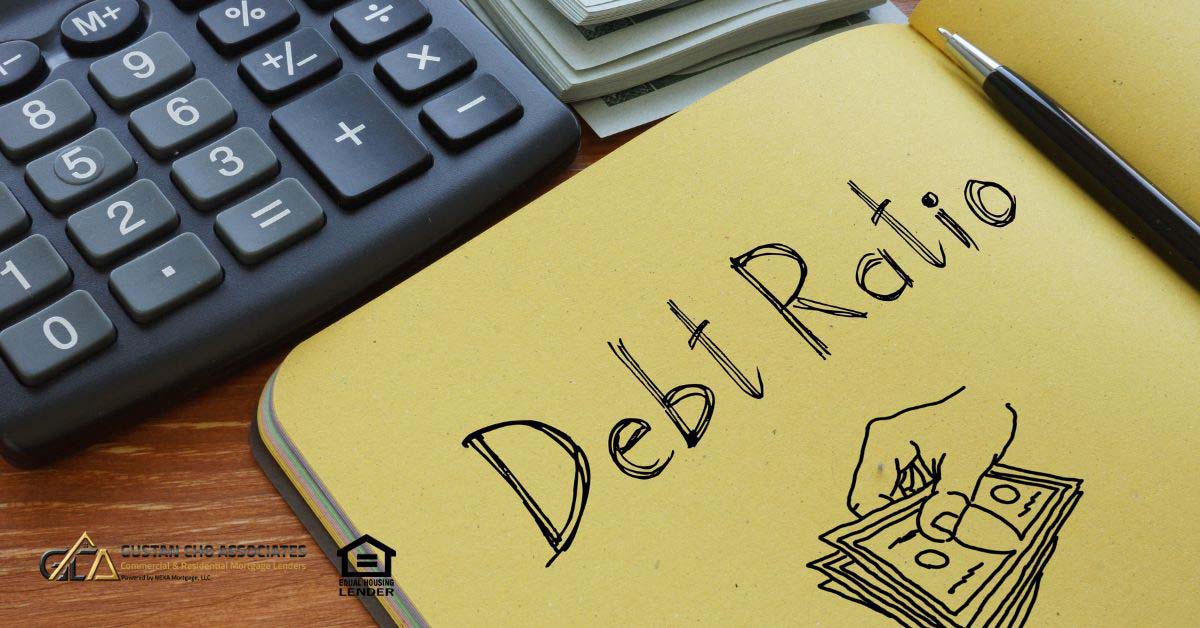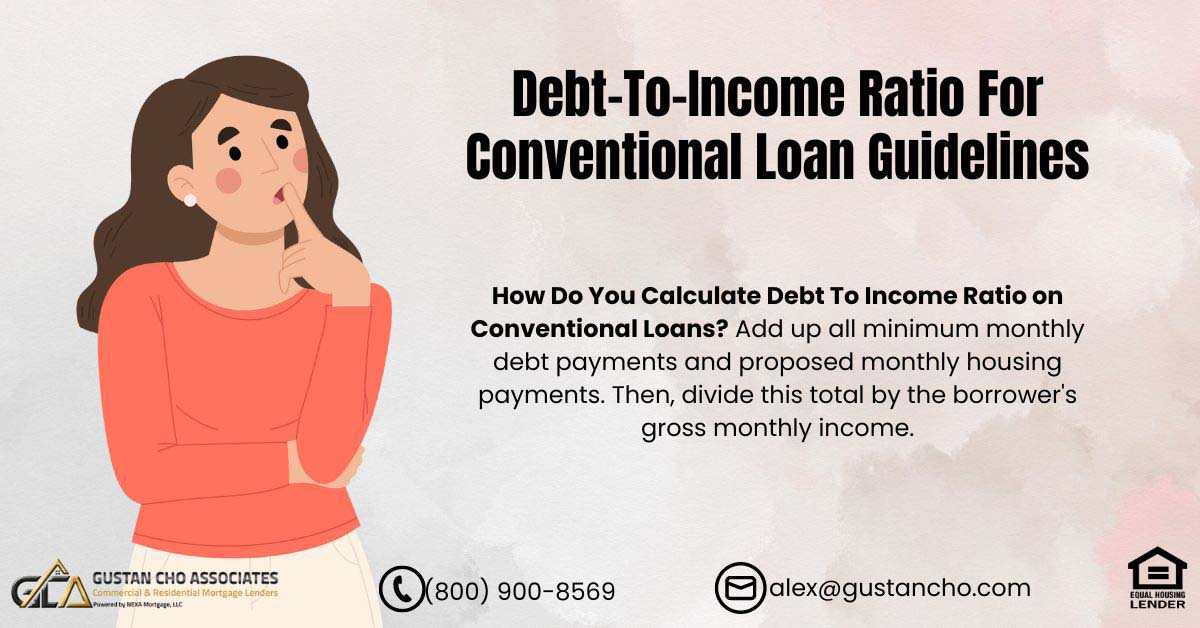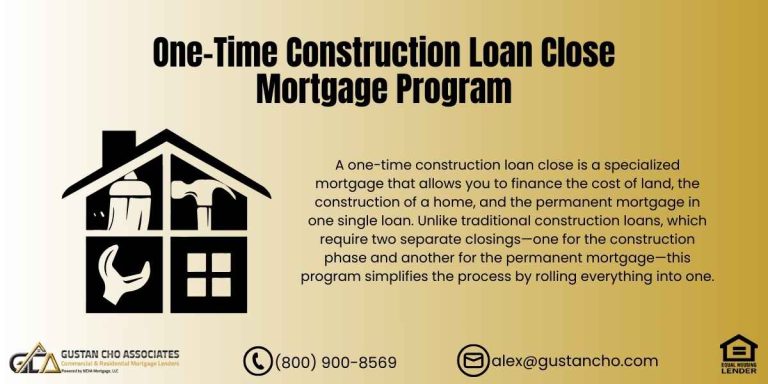This guide covers all about Debt-To-Income Ratio for Conventional Loan: Your 2024 Guide to Homeownership with conventional loans: Are you wondering if you can qualify for a conventional loan to buy a home or refinance your current mortgage? Lenders take into account your debt-to-income ratio (DTI) as one of the crucial factors. This guide on debt-to-income ratio for conventional loan will walk you through everything you need to know about how mortgage underwriters calculate debt-to-income ratio. We will go in debt on how debt-to-income ratio for conventional loan is calculated. Every mortgage loan program have maximum front-end and back-end debt-to-income ratio caps. In the following paragraphs, we will cover Fannie Mae and Freddie Mac guidelines on debt-to-income ratio for conventional loan.
The Role of Fannie Mae and Freddie Mac
The role of Fannie Mae and Freddie Mac is to provide liquidity in the housing markets by buying mortgage loans funded by lenders on the secondary market. When a direct mortgage lender originates a home loan, they use their warehouse line of credit to fund the loan. Once the lender funds the loan, they need to sell the loan on the secondary market so they can pay down their warehouse line of credit. By paying down the warehouse line of credit, the direct mortgage lender can repeat the cycle of originating and funding more loans. Due to Fannie Mae and Freddie Mac, lenders are able to keep originating more and more loans at competitive rates. The cycle of how mortgage banking companies work with Fannie Mae and Freddie Mac keeps liquidity in the housing and mortgage markets at competitive rates.
The Importance of Debt-to-Income Ratio For Conventional Loan
Fannie Mae and Freddie Mac are the two mortgage giants (government-sponsored enterprises) that set mortgage guidelines on conventional loans. Conventional loans are not backed by any government agency like FHA, VA, and USDA loans are. Then why does conventional loans need to conform to Fannie Mae or Freddie Mac agency guidelines? The reason is because Fannie Mae and Freddie Mac are the two largest purchasers of mortgage loans. Fannie Mae and Freddie Mac will not purchase any conventional loans that do not conform to its agency guideliines. In the following paragraphs, we will cover debt-to-income ratio for conventional loan in 2024, explain what it means, how to calculate it, and why it matters when buying a home or refinancing your mortgage. Whether you’re a first-time homebuyer or looking to refinance, understanding your DTI ratio can make all the difference in your loan approval process.
What is a Debt-to-Income Ratio for Conventional Loan?
Conventional loans does not have a maximum front-end debt-to-income ratio. Conforming loans just has a back-end debt-to-income ratio. The percentage of your monthly income used to pay off your debts is your debt-to-income ratio. Debt-to-income ratio for conventional loan is a good indicator on the borrower’s ability to repay their new home loan. Lenders use this number to figure out how much mortgage you can afford. A high DTI might make it harder to get approved, while a low DTI shows you have more income available after paying your bills, making you a lower risk to lenders. The standard maximum debt-to-income ratio for conventional loans is 45%, meaning almost half of your monthly income can be used to pay all debts, including your mortgage. Debt-to-income is calculated by adding all of your monthly debts divided by the borrower(s) monthly gross income. However, debt-to-income ratio for conventional loan caps at 50% DTI if the borrower’s credit scores are 700 FICO or higher.
Worried About Your Debt-to-Income Ratio for a Conventional Loan? Let’s See If You Qualify!
Contact us today to find out how your DTI affects your mortgage eligibility and get pre-approved.
Why Is Debt-to-Income Ratio Important?
Lenders aim to verify that you can handle your mortgage payments without feeling overly burdened. The debt-to-income ratio helps them see if you’re financially stable enough to handle a new loan or refinance an existing one. If you have a high DTI, lenders might worry that adding a mortgage on top of your other debt could stretch your finances too thin, making it harder for you to make timely payments. A lower DTI ratio, on the other hand, indicates that you’re managing your debt well and have enough income left over each month to cover new payments. Lenders are inclined to authorize your loan when your DTI ratio falls within acceptable limits.
How to Calculate Your Debt-to-Income Ratio
Calculating your DTI ratio is easier than you think. Follow these simple steps to find out where you stand:
- Add up your monthly debt payments . Only include the monthly debts that report to the credit bureaus. Mortgage underwriters do not use non-traditional debts. Non-traditional credit tradelines are tradelines that do not report on the credit bureaus. For example, utilities, cell phone bills, internet, cable, insurance, education, and other creditors that do not report on credit bureaus are not included in your debt-to-income ratio for conventional loan. The following credit tradelines are included in the calculations of debt-to-income ratio:
- Mortgage or rent payments
- Car loans
- Credit card payments
- Student loans
- Personal loans
- Child support or alimony payments
- Divide your gross monthly income by that number. Your gross income refers to your income before taxes and deductions.
- Multiply the result by 100 to get a percentage. That’s your debt-to-income ratio.
Case Scenario of Debt-to-Income Ratio For Conventional Loan
We can simplify this. Your debt-to-income ratio for a conventional loan would be 40% if your total monthly debt payments amount to $2,000 and your gross income is $5,000 before taxes. Here’s how it works:
- You take the $2,000 you spend on monthly debts (things like credit cards, car loans, and other payments).
- Then, you divide that by your $5,000 monthly income (2000/5000 = 0.4).
- Multiply that by 100 to get a percentage (0.4 X 100 = 40%).
So, 40% of your income is used to pay off debts. This debt-to-income ratio is important because lenders look at it to decide if you can afford a conventional loan. A lower number means you have more room for a mortgage.
What is the Highest Allowable Debt-to-Income Ratio for Conventional Loan?

Front-End vs. Back-End Debt-to-Income Ratio For Conventional Loan
When talking about DTI, you might hear two terms: front-end and back-end. Here’s the difference:
- Front-End DTI: This measures your housing expenses, including your mortgage payment, property taxes, homeowners insurance, and homeowners association (HOA) fees. Conventional loans don’t have a set requirement for front-end DTI, but keeping it under 28% is ideal.
- Back-End DTI: This includes all your monthly debts—housing costs plus car loans, credit cards, and other obligations. Most lenders focus on this ratio when evaluating you for a conventional loan, and it shouldn’t exceed 50%.
Looking to Buy a Home? Let’s Check Your Debt-to-Income Ratio for Conventional Loan Approval!
Reach out now to see how we can help you qualify with the right DTI ratio and secure your home loan.
Updates for 2024: New Rules for Debt-to-Income Ratio For Conventional Loan
Fannie Mae and Freddie Mac upheld the maximum back-end debt-to-income ratio for conventional loans at 45% to 50% in 2024. This means lenders can approve loans even if half your monthly income goes to debt. This cap offers flexibility for borrowers who may have higher debt levels but still maintain good credit and financial reserves. However, qualifying with a high DTI can be easier if you meet certain criteria:
- Credit Score Above 680: Borrowers with a credit score above 680 may have more flexibility in meeting DTI requirements.
- Significant Down Payment: Putting down more money upfront (more than 20%) can increase your chances of approval, even with a higher DTI.
- Financial Reserves: Lenders like to see that you have several months’ worth of mortgage payments in savings.
How Can One Qualify for a Conventional Loan with a High DTI?
If your debt-to-income ratio is close to the 50% limit, you can still qualify for a conventional loan with some extra effort. Here are some tips to improve your chances:
- Up Your Credit Score: Demonstrating effective debt management through a higher credit score can indicate to lenders that you are capable, even if your DTI ratio is elevated. Repay current debts, ensure timely payments, and refrain from initiating new lines of credit before applying for a loan.
- Increase Your Down Payment: A larger down payment reduces your loan amount, which can help lower your monthly mortgage payment and, in turn, your DTI ratio. First-time homebuyers can get away with as little as 3% down, but more is always better.
- Show Compensating Factors: If your DTI is high, highlight any other strengths in your application. Lenders might approve you with a solid employment history, significant savings, or a strong financial profile beyond your debt.
How Does Debt-to-Income Ratio Affect Your Mortgage?
Your DTI ratio directly impacts the amount of mortgage you can afford. Lenders use it to calculate how much a monthly mortgage payment fits within your budget without putting you under financial strain. Here’s how:
- Low DTI (<36%): You’re in great shape! You’ll likely qualify for the best interest rates and loan terms, as lenders see you as low risk.
- Moderate DTI (36%-43%): You can still qualify for a loan, but your rate might be slightly higher. Lenders may ask for more documentation or compensating factors.
- High DTI (43%-50%): Approval is possible, but you’ll need a strong overall financial profile. Some lenders might charge higher rates or ask for more upfront.
How to Improve Your Debt-to-Income Ratio
If you find that your debt-to-income ratio is higher than desired, there are actions you can take to reduce it before seeking a conventional loan:
- Pay Off Debt: To free up more monthly money, first focus on paying off high-interest debts like credit cards or personal loans.
- Increase Your Income: This could be through a new job, side gigs, or asking for a raise. The more income you have, the lower your DTI will be.
- Avoid New Debts: Don’t open new credit lines or take on additional loans in the months before your mortgage application.
- Refinance Existing Debts: Refinance your existing loans to lower your monthly payments, which can reduce your DTI ratio.
What If My DTI Is Above 50%?
If your debt-to-income ratio is above 50%, it might be harder to get approved for a conventional loan, but it’s not impossible. Some lenders offer non-QM (non-qualified mortgage) loans for borrowers who don’t meet the standard DTI guidelines. Loans have fewer requirements but usually have higher interest rates and require larger down payments. Alternatively, you could consider an FHA loan, which allows higher DTI ratios—up to 36.9% front-end and 56.9% back-end—depending on your credit score and other factors. FHA loans also require lower down payments (as little as 3.5%). They may be easier to qualify for if you have a high DTI but strong credit and financial reserves.
2024 Fannie Mae and Freddie Mac Guidelines on Conventional Loans
Besides the debt-to-income ratio, there are other important requirements to qualify for a conventional loan in 2024:
- Minimum Credit Score: To be eligible for a conventional loan, you must have a minimum score of 620. However, a score of 740 or higher is ideal to get the best interest rates.
- Down Payment: The minimum down payment for a conventional loan is 5%, though first-time homebuyers can qualify with as little as 3% down. Remember that if you put down less than 20%, you must make payments for private mortgage insurance (PMI).
- Loan Limits: The loan limits for 2024 have been revised by Federal housing Finance Agency. The maximum loan amount depends on the location. Conventional loan limit for 2024 is $766,550 and $1,149,550 in high-cost areas.
Ready to Buy a Home with a Conventional Loan? Let’s Make Sure Your DTI Works in Your Favor!
Reach out today to learn how we can help you optimize your DTI and get approved for your mortgage.
Conclusion: Let’s Get You Approved!
One crucial step in getting a conventional loan is understanding your debt-to-income ratio. Whether buying a new home or refinancing, knowing how to manage your DTI ratio can make a huge difference in getting approved.
If you’re ready to take the next step toward homeownership, contact us at Gustan Cho Associates. We specialize in helping borrowers with all kinds of financial situations, including those with high DTI ratios.
Gustan Cho Associates has a national reputation for its no lender overlays on government and conventional loans, meaning we go strictly by Automated Underwriting System (AUS) findings. Therefore, you don’t have to worry about additional requirements from us. Call us at 800-900-8569 or email us at gcho@gustancho.com today to start your journey toward a new home. We’re available seven days a week, including evenings and holidays, to help you find the right loan for your needs.
Frequently Asked Questions About Debt-to-Income Ratio for Conventional Loan
Q: What is The Debt-to-Income Ratio For Conventional Loan?
A: The debt-to-income ratio for a conventional loan is the percentage of your monthly income used to pay off your debts. Most lenders require a back-end DTI ratio of 50% or less, meaning half of your income can be spent on debt, including your mortgage.
Q: How Do I Calculate My Debt-to-Income Ratio for Conventional Loan?
A: Remember to calculate your debt-to-income ratio by totaling all your monthly debt payments (including mortgage, car loans, and credit cards) and dividing that sum by your gross monthly income. Afterward, multiply the outcome by 100 to obtain your DTI percentage.
Q: What’s The Highest Allowable Debt-to-Income Ratio for Conventional Loan?
A: The highest debt-to-income ratio for conventional loans is typically 50%. Some lenders may allow higher DTIs if you have a strong credit score, a big down payment, or significant savings.
Q: What’s the Difference Between Front-End and Back-End Debt-to-Income Ratio?
A: The front-end DTI includes only your housing costs (mortgage, taxes, insurance), while the back-end DTI includes all debts (housing, car loans, credit cards). Conventional loans focus on the back-end DTI, which should not exceed 50%.
Q: Can I Qualify for a Conventional Loan With a High Debt-to-Income ratio?
A: Qualifying for a conventional loan with a high debt-to-income ratio is possible if you possess strong compensating factors. These factors may include a high credit score, a larger down payment, or financial reserves.
Q: How Does My Debt-to-Income Ratio Affect My Mortgage Approval?
A: Your debt-to-income ratio (DTI) is one of the key factors lenders consider. A low DTI makes it easier to get approved for a conventional loan. At the same time, a higher DTI might mean you need to provide more documentation or face stricter lending terms.
Q: What Happens if My Debt-to-Income Ratio is Over 50%?
A: If your debt-to-income ratio is less than 50%, it may be harder to get a conventional loan. However, you may still qualify through alternative programs like non-QM loans or an FHA loan, which allows higher DTIs.
Q: How Should I Decrease My Debt-to-Income Ratio to Qualify for Conventional Loan?
A: To lower your debt-to-income ratio, pay off existing debts, increase your income, avoid taking on new debt, and consider refinancing current loans to reduce monthly payments.
Q: Do I Need a Good Credit Score if My Debt-to-Income Ratio is high?
A: Yes, if your debt-to-income ratio for conventional loan is on the higher end, a good credit score (usually above 680) can improve your chances of getting approved and possibly qualify you for better loan terms.
Q: What Are The 2024 Updates On Debt-to-Income Ratio for Conventional Loan?
A: In 2024, Fannie Mae and Freddie Mac maintained the maximum debt-to-income ratio for conventional loans at 50%, offering flexibility for borrowers with good credit, financial reserves, and larger down payments.
This blog about “Debt-To-Income Ratio For Conventional Loan Guidelines” was updated on September 24th. 2024.
Want to Know How Your DTI Ratio Affects Your Conventional Loan Approval? Let’s Discuss It!
Contact us now to learn more about how we can help you with your DTI and mortgage application.









